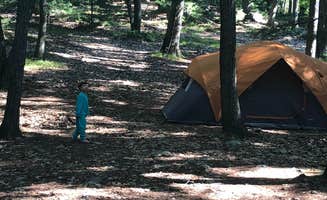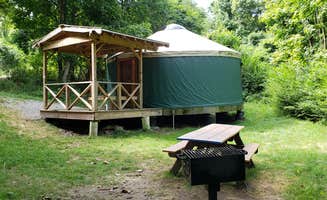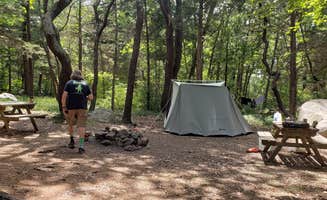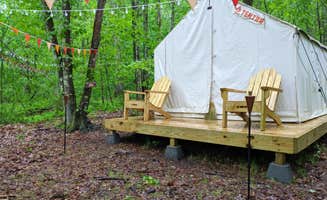Tent campsites near Framingham, Massachusetts range from 30 to 90 minutes driving distance depending on direction. The area features a mix of coastal and inland camping options across eastern Massachusetts, with most accessible sites opening from May through mid-October. Summer humidity can be significant, especially at waterfront locations, where evening temperatures often drop to the mid-60s even after hot days.
What to do
Water exploration at Tully Lake: The 1,200-acre Tully Lake offers extensive paddling opportunities with canoe and kayak rentals available directly at the campground. "We rented kayaks right at the campground for a paddle around Tully Lake. Great trip!" shares Megan G. at Tully Lake Recreation Area.
Island hopping from Boston Harbor: From June through early September, campers can use inter-island ferries to explore multiple harbor islands after setting up camp. "While you're out on the islands, take time to explore one of the others...look for sea glass on Spectacle Island and climb the hill for a view of the Boston skyline, explore the old forts and visitors centers," explains a camper at Boston Harbor Islands State Park Campground.
Hiking at Doane's Falls: Located near Tully Lake, this series of cascading waterfalls provides excellent photography opportunities on an ascending wooded path. "The highlight was Doane's falls, a very quick walk from the campground area," notes Jean C. about visiting from Tully Lake campground.
What campers like
Island privacy: Boston Harbor Islands provides a unique escape from urban crowds despite proximity to the city. "Camping at Boston Harbor Islands requires some planning, but you get the benefit of a remote island with minimal company," notes one visitor.
No-vehicles camping atmosphere: Several campgrounds near Framingham offer car-free camping environments. "No cars at all at the campsites, which was great for peace of mind as our toddler roamed around. It also made for a super quiet stay," explains a visitor at Tully Lake Recreation Area.
Coastal access for swimming: Beach proximity is a major draw for campers at Cape Ann Camp Site. "Beach down the street was big, beautiful and low tide was unexpected as you could walk for ever," shares Ron C. about Cape Ann's nearby coastal options.
What you should know
Varied site access methods: Several campgrounds require non-standard access. "This is a 'Carry In' campground. You park at the entrance, register with Ranger. Large wooden wheelbarrows are provided to bring your gear to your camp site," explains a camper about Tully Lake Recreation Area.
Ferry planning required: "Figuring out the schedule is the trickiest part, not least because they don't make the inter-island ferry schedule as readily accessible," notes a visitor about Boston Harbor Islands. Checking both departure point options (Long Wharf in Boston and Hingham) is essential.
Pay showers common: Many campgrounds in the area require quarters for showers. "The showers require payment with quarters. I don't know how many quarters it takes because I don't carry change. So I washed my hair in the sink," explains Ben E. at Cape Ann Camp Site.
Seasonal water limitations: Water access varies significantly by campground. "If you want to grill, bring your own charcoal; otherwise bring a stove or bring food that doesn't need to be cooked," advises a Boston Harbor Islands camper, who adds "bring gallon of water/person" for most island sites.
Tips for camping with families
Tent options with bathroom proximity: For families with young children, consider bathroom location when booking. "Our site was fairly far from services, long run with small kids in the middle of the night," shares Lauren A. about her experience at Tully Lake Recreation Area.
Swimming options for kids: Several campgrounds offer shallow, protected swimming areas. "The camp is also adjacent to Breakheart Reservation, which had a great shallow pond with life guard on duty as well as bike trails and a range of different hikes," notes Michael V. about Camp Nihan Education Center.
Site privacy levels: Tent sites generally offer more seclusion than RV areas. "Cape Ann Campground is clean and quiet with beautiful tent sites. The RV sites are not as secluded as the tent sites," reports Della S., providing useful comparison information for families seeking privacy.
Gear transport planning: With several cart-in campgrounds, families should pack strategically. "The sites are spacious and though there is not a bad site, some are better suited for certain purposes like group camping," explains a visitor to Tully Lake, adding "Keeping gear to a minimum is a good idea."
Tips from RVers
Site differences for tents vs. RVs: Campers note distinct differences between tent and RV accommodations. "The sites are nice and wooded. It doesn't look like much but it is absolutely lovely when you actually pull in," reports Cristina P. about tent camping at Cape Ann Camp Site, where RV spaces have less natural screening.
Cell service considerations: Many campgrounds have limited connectivity. "Cell coverage is pretty close to absent or poor in most of the area, so download any maps you might want (driving, trail, geocaching) before you arrive," advises a visitor to Tully Lake Recreation Area.
Seasonal considerations: Most campgrounds near Framingham have limited seasons. "The campground is only open during the summer months," notes Martha H. about Boston Harbor Islands. Similarly, Cape Ann Camp Site operates from May 15 to October 15, with most water-dependent amenities closing by early September.





